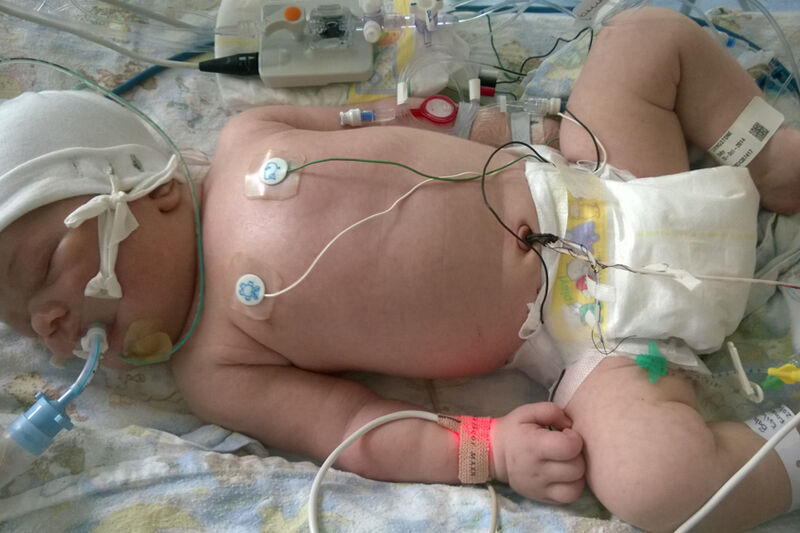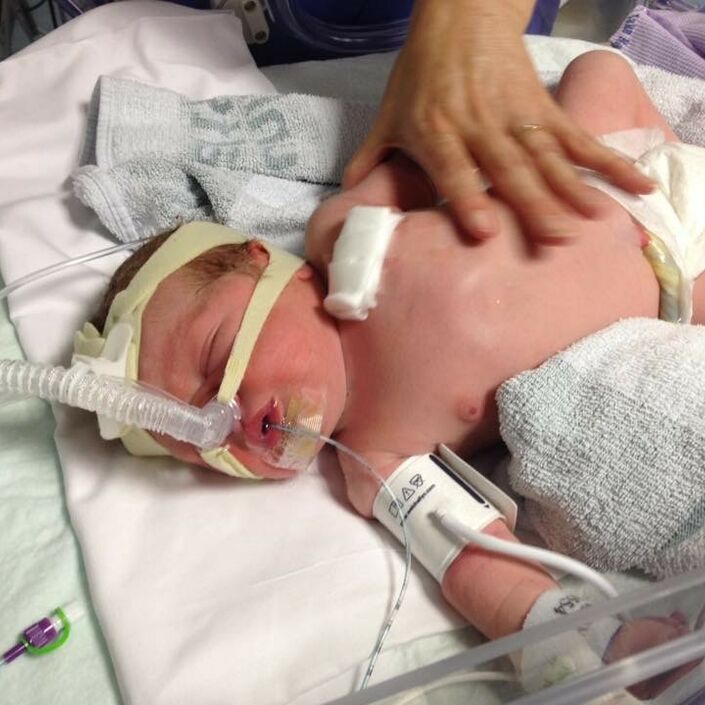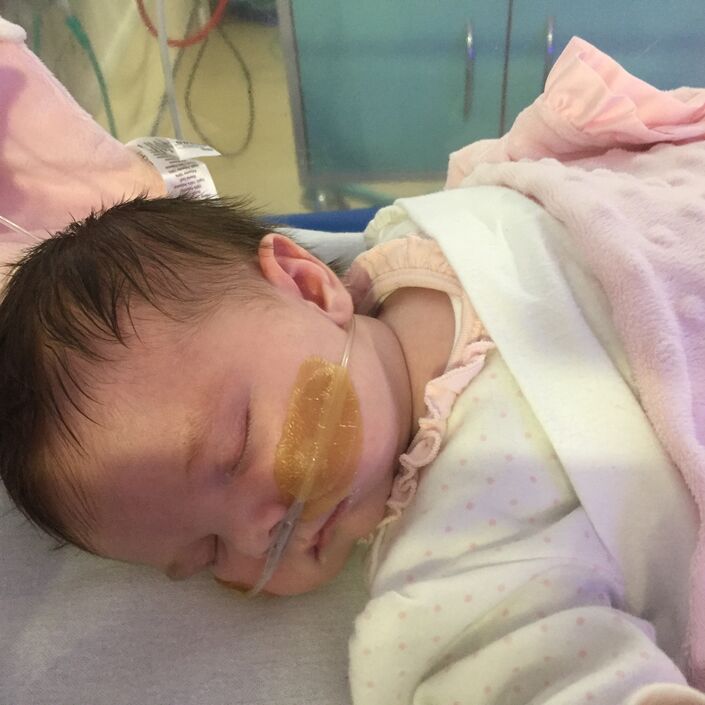Our daughter was due in October 2014. That date came and went and ten long days later I went into labour at 6.30am. I had taken birthing classes and researched thoroughly, so felt calm and in control. My midwife had told me at my last appointment that the baby was lying back to back so I knew labour and delivery might be more difficult.
But, feeling empowered by the natal hypnotherapy techniques I had practiced I was ready. Contractions came every three minutes from the start and by 1.00pm they became closer together so I thought I should go into hospital. We arrived at the maternity triage only to be told that I was only 1cm dilated and should go home and take some paracetamol. We went home, with me feeling upset and pathetic.
At home the contractions continued at the same short intervals. I had been trying to stay hydrated and eat toast to keep my strength up but just couldn’t keep anything down all day. By 8.30pm I was exhausted and yet I didn’t seem to be making any progress. I rang the hospital. They told me not to come in yet as they didn’t think I was in enough pain. At 9.00pm I told my partner I’d had enough and to take me anyway.
I was examined and put on a monitor. The baby’s heartbeat was too fast. I was told I wouldn’t be getting the water birth I’d planned as I needed to be on the delivery suite, not in the birthing centre. By then I didn’t care - I was still only 3cm dilated and just glad someone was finally listening to me.
As the night progressed, the contractions continued to distress the baby and after breaking my waters and doing scalp tests on my daughter, a team of concerned doctors and nurses told me there was a lot of meconium present, her blood pH levels weren’t right and they would need to perform an emergency caesarean.

Eva was born in the early hours. I wasn’t aware at the time though as she didn’t make a sound. She had swallowed and inhaled meconium so she had a high risk of infection and her lungs didn’t work properly. As a result she developed Persistent Pulmonary Hypertension in the Newborn (PPHN).
Her Apgar score was four and the medical team gave her oxygen to help her breathe. My memory of this time is hazy - probably due to the drugs I’d been given. I remember them wheeling the cot past me as she was taken up to NICU and that was the last I saw of her for 12 hours.
I was completely unprepared for what greeted me as I was wheeled through the NICU double doors for the first time. She had wires all over her. Naively my brain just hadn’t accepted how poorly she really was. She was full term - this wasn’t supposed to happen. I broke down. I remember a nurse telling us to take things an hour at a time. Everything else is a blur.
At midnight Eva had to be transferred to a hospital 20 miles away. They had more specialist equipment and she needed a high frequency ventilator. The transfer team were lovely. We were with her the whole time until she was taken to the ambulance. I was taken separately in another and my partner went home to get some much needed rest. The journey was pretty uncomfortable. Being in the back of what is essentially a van less than 12 hours post c-section wasn’t great but the paramedic and the midwife who travelled with me were just wonderful. We were even laughing and joking for some of the journey. It was surreal.

Once at the hospital, Eva was also given nitric oxide treatment and an antibiotic drip. The ventilator delivered about 600 “breaths” per minute. My poor baby was vibrating in her incubator. She was sedated so couldn’t make a sound or move. The nitric oxide was given to expand the cells in the lungs to help deliver as much oxygen as possible to the blood and the antibiotics were to fight infection from the meconium.
The staff on the neonatal intensive care unit (NICU) were phenomenal. Eva made huge improvements and after three days we were given the amazing news that she was well enough to be transferred back to continue to get better on the Special Care Baby Unit (SCBU). She no longer needed to be ventilated and the nitric oxide and antibiotics were not necessary anymore. I fell into my partner’s arms and sobbed. She wasn’t going to die. We knew there was a chance of brain damage due to her being deprived oxygen but for now I couldn’t be happier.
Eva spent one night in the High Dependency Unit before going into SCBU the next morning. The next phase was simply to let her lungs mend and slowly reduce the amount of oxygen she needed. It was a frustrating process. One day she would do really well then the next would struggle. She was also given hearing tests that came back all clear.
It was strange being in hospital. All the other babies were premature. Eva was the only full term baby there and the staff referred to her fondly as “The Giant”. At 9lb 6oz she was huge in comparison. I felt there wasn’t much help and advice other than Bliss for babies born full term, as most forums and internet searches were focused on premature babies.

The Bliss website and leaflets were a brilliant source of information when I needed to understand how to manage both mentally and logistically with having a sick baby in neonatal care. Their advice on bringing a baby home on oxygen was particularly useful at a time when we had to decide if we would be happy to do that.
I would be on the ward 8.30am - 8.30pm. As I was trying to breastfeed her I wanted to be with her as much as I could. I felt sorry for my partner. He would drop me off and see her in the morning but there was very little for him to do so he’d go home and be alone all day until about 5.00pm when he would come back. After a while it was time for him to go back to work so paternity leave had not been the bonding experience we’d expected.
I made friends with other mums on the ward. We would chat about our babies’ progress while eating our packed lunches in the family room. As lovely as it was sharing experiences, I always felt slightly removed from their situation. I hadn’t had the final weeks of pregnancy taken from me like they had. My baby was what many refer to as a “good healthy weight”. Well, she wasn’t healthy at all and she still looked tiny and vulnerable to me.
Gradually Eva became less and less dependent on the oxygen. We both worked hard establishing breastfeeding and eventually we took her home. It felt like we’d been in hospital for months but actually it had only been just over a fortnight. I am in awe of anyone who spends any time on a neonatal ward but long periods must be nothing short of horrific. Time stands still.

Eva is now two and a half years old. She was discharged from consultant care at six months and following brain scans, tests and check-ups she is 100 per cent healthy with no lasting brain damage. My partner and I feel like the luckiest people alive and cannot thank the NHS enough for everything they did for her.
I do still feel angry about not being listened to properly in the early stages of my labour; if I had been monitored earlier we may have avoided the whole thing. But we can’t change that now. I just try to look forward to enjoy every day as a family.
If you have been affected by any of the issues mentioned in this post and would like support, you can view our online support pages.


